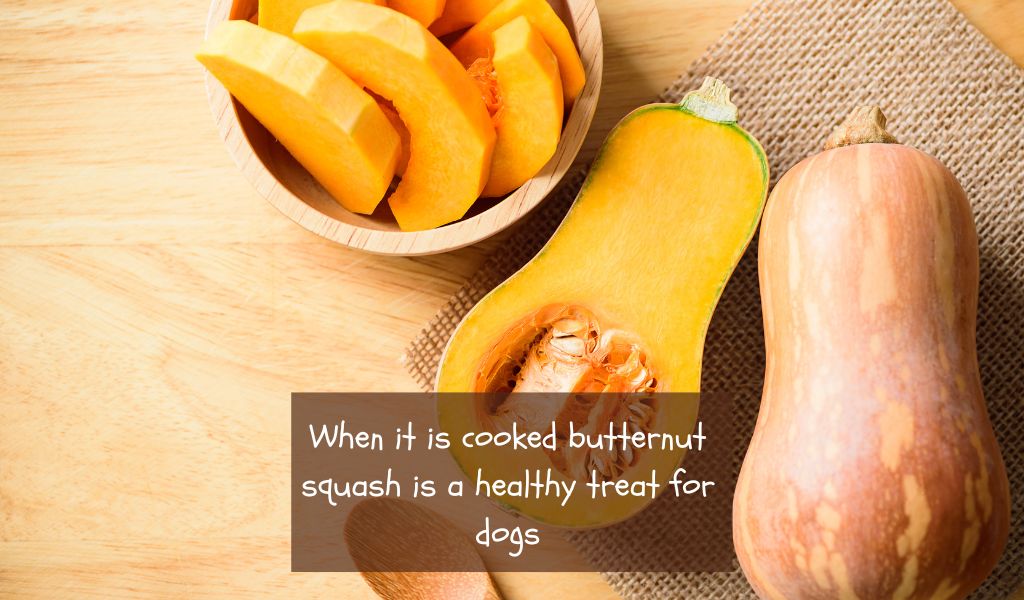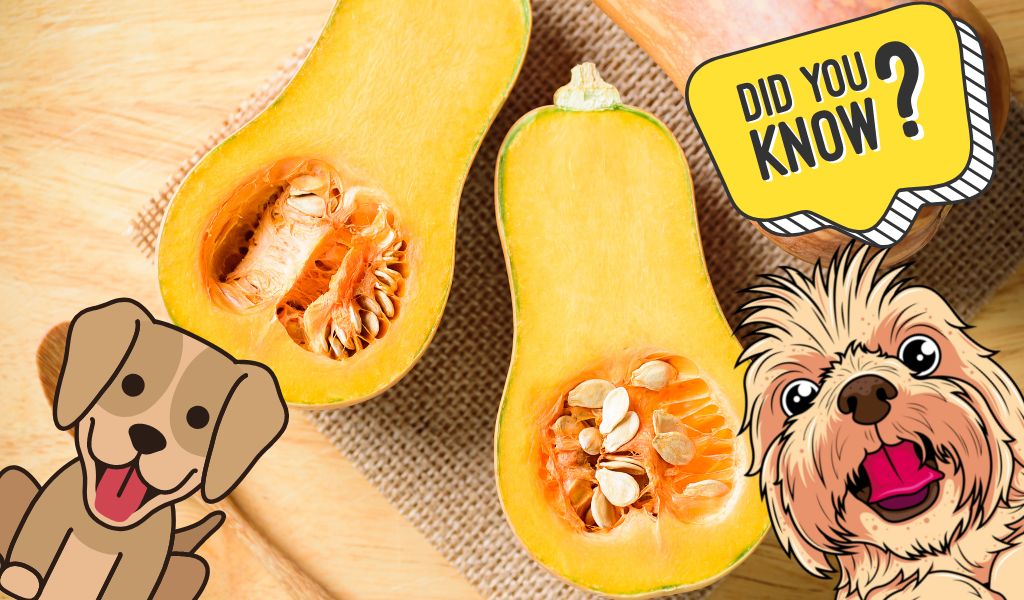As a pet owner, you may often wonder about the safety of feeding certain human foods to your canine companion.
Can dogs eat butternut squash? The short answer is yes, but there’s more to know about the benefits and potential risks of giving your dog this versatile vegetable. Let’s dive into the details.
Dogs can eat butternut squash as it is a healthy and nutritious treat when prepared and served in moderation. Cook the squash, remove the skin, seeds, and pulp, and cut it into small pieces before serving it to your dog.
What is Butternut Squash?
Butternut squash is a type of winter squash with a sweet, nutty flavour and a smooth, creamy texture.
This nutrient-rich vegetable is packed with vitamins, minerals, and antioxidants, making it a healthy addition to human diets. But what about for our furry friends?
Nutritional Benefits of Butternut Squash for Dogs
Butternut squash offers numerous health benefits for dogs, including:
Vitamin A: Supports vision, immune system function, and overall growth and development.
Vitamin C: Helps maintain healthy skin, coat, and immune system function.
Fibre: Aids in digestion and can help manage weight by providing a feeling of fullness.
Antioxidants: Protects cells from damage caused by free radicals and may reduce inflammation.

Potential Risks of Butternut Squash for Dogs
While butternut squash is generally safe for dogs to consume, there are some potential risks to be aware of:
Choking Hazards
Raw butternut squash can be hard and difficult for dogs to chew, posing a choking hazard.
The seeds and skin may also present a choking risk and should be removed before serving to your pet.
Allergic Reactions
Although rare, some dogs may be allergic to butternut squash.
Keep an eye out for signs of an allergic reaction, such as itching, swelling, or difficulty breathing.
Gastrointestinal Issues
Overfeeding your dog with butternut squash may lead to gastrointestinal issues, including diarrhea or constipation. Start with small portions and monitor your pet’s reaction.
How to Safely Prepare Butternut Squash for Dogs
Follow these steps to safely prepare butternut squash for your dog:
Remove the Skin, Seeds, and Pulp
Before cooking, remove the tough outer skin, seeds, and fibrous pulp from the squash, as these parts may pose choking hazards or cause digestive issues.
Cook the Squash
Cook the butternut squash to soften its texture, making it easier for your dog to digest. Baking, boiling, or steaming are all suitable methods.
Avoid adding any spices, seasonings, or oils, as these may upset your dog’s stomach.
Cut into Small Pieces
Once the squash is cooked and cooled, cut it into small, bite-sized pieces that are appropriate for your dog’s size.
This will make it easier for them to chew and digest.
How Much Butternut Squash Should Dogs Eat?
When feeding your dog butternut squash, moderation is key.
Begin by offering a small portion to ensure your dog doesn’t have an adverse reaction.
If your dog tolerates it well, you can gradually increase the amount, but remember that butternut squash should not replace their regular diet.
It should be an occasional treat or supplement, making up no more than 10% of their daily food intake.
Alternatives to Butternut Squash
If your dog doesn’t like butternut squash or you’re looking for other vegetables to incorporate into their diet, consider these healthy alternatives:
Sweet potatoes
Green beans
Pumpkin
These vegetables also provide vitamins, minerals, and antioxidants that can benefit your dog’s overall health.
FAQs
Q1: Can dogs eat raw butternut squash?
A: It’s best to cook butternut squash before feeding it to your dog, as raw squash can be difficult for them to chew and digest, posing a choking hazard.
Q2: Can dogs eat butternut squash seeds?
A: No, dogs should not eat butternut squash seeds, as they can pose a choking hazard or cause digestive issues. Always remove the seeds before serving squash to your dog.
Q3: Can dogs have butternut squash soup?
A: It’s not recommended to give your dog butternut squash soup, as it often contains added spices, seasonings, and oils that can upset their stomach. Stick to plain, cooked butternut squash instead.
Q4: How often can I give my dog butternut squash?
A: Butternut squash can be given as an occasional treat or supplement, making up no more than 10% of your dog’s daily food intake. Always monitor your pet for any adverse reactions and consult your veterinarian if you have concerns.
Conclusion and final thoughts
In conclusion, butternut squash can be a healthy and nutritious treat for your dog when prepared and served in moderation.
Remember to remove the skin, seeds, and pulp, cook the squash thoroughly, and cut it into small pieces before serving.
Always monitor your pet for any signs of an allergic reaction or digestive issues, and consult your veterinarian if you have concerns about your dog’s diet.




